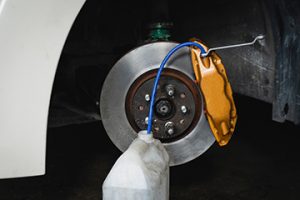Bleeding Your Brakes: What It Is and When to See a Mechanic in Shelbyville
Your vehicle’s braking system relies on hydraulic pressure to stop your wheels—and that means it must stay free of air bubbles to work properly. So, that’s why bleeding your brakes is an important part of keeping your vehicle safe. Since air in the brake lines weakens braking power, removing it ensures your brakes respond quickly and smoothly. Whether you’re driving through Shelbyville or heading out to enjoy the wonderful spring weather, firm and reliable brakes give you the control you need.
At Meineke in Shelbyville, our expert technicians offer complete brake inspections, fluid services, and also brake bleeding to keep your vehicle stopping with confidence. So, in this post, we’ll explain what brake bleeding is, how it works, why it matters, how to care for your system, and when to visit a mechanic.
So, What Is Brake Bleeding and How Does It Work?
Brake bleeding is the process of removing air from your brake lines. Since your brakes work by pushing hydraulic fluid through a closed system, air pockets can reduce pressure and make the pedal feel soft. When you press the brake pedal, the master cylinder sends brake fluid through the lines to press the pads against the rotors.
If air is in the system, then it compresses more easily than fluid, which results in delayed braking or a spongy pedal. During brake bleeding, a mechanic opens each brake line valve and pumps fresh fluid through until all air bubbles are gone.
Why Is Brake Bleeding So Important?
Even small amounts of air in the brake system can cause serious safety issues.
-
Improves brake response – If the system is free of air, then the brake pedal feels firm and responsive.
-
Restores full stopping power – If fluid flows properly, then your vehicle stops more quickly and safely.
-
Prevents uneven braking – If each wheel gets equal pressure, then your car stays stable when stopping.
-
Protects the brake system – If the fluid stays clean, then rust and corrosion are less likely to form.
-
Supports regular brake maintenance – If bleeding is done with fluid changes, then your entire system stays healthier.
How to Maintain Your Brake System
While you may not bleed your brakes often, taking care of the overall system helps prevent problems.
-
Change brake fluid every 2 to 3 years – If old fluid breaks down, then air and moisture can enter the system.
-
Check for leaks or soft pedal feel – If the pedal feels spongy or sinks to the floor, then bleeding may be needed.
-
Have brakes inspected during routine service – If your mechanic checks fluid levels and line pressure, then you’ll catch problems early.
-
Use the correct brake fluid – If the fluid type matches your vehicle’s needs, then your brakes stay reliable.
-
Avoid topping off old fluid – If your fluid looks dark or dirty, then a full flush and bleed may be needed.
When to See a Mechanic in Shelbyville
Brake bleeding is not a task to ignore—especially if your braking feels less reliable than usual. So, Visit Meineke in Shelbyville if:
-
Your brake pedal feels soft, squishy, or spongy
-
You need to press the pedal harder to stop the vehicle
-
Your brakes feel delayed or uneven when stopping
-
You just replaced brake pads, calipers, or a master cylinder
-
Your brake fluid looks dirty or cloudy in the reservoir

So, Call Meineke in Shelbyville Today for a Brake System Check
Since bleeding your brakes removes trapped air and keeps your vehicle stopping safely, it’s an important part of regular maintenance. But if your pedal feels soft or your stopping distance increases, Meineke on Midland Trail in Shelbyville is ready to help. Whether you need a full brake fluid flush, a line bleed, or a complete brake inspection, our experienced technicians will get your brakes back in top shape. So, don’t take chances with your safety—call Meineke in Shelbyville today for a brake check-up.
If the Meineke in Shelbyville is not a convenient auto repair center for you, Meineke also has 15 car repair centers is Kentucky:
Meineke Car Care – Dixie Hwy
5326 Dixie Highway
Louisville, KY 40216
Call (844) 311-4548
Meineke Car Care – Preston Hwy
7103 Preston Highway
Louisville, KY 40219
Call (844) 605-8457
Meineke Car Care – Bardstown Rd
4170 Bardstown Road
Louisville, KY 40218
Call (844) 321-3541
Meineke Car Care – East Broadway
701 East Broadway
Louisville, KY 40202
Call (855) 973-7820
Meineke Car Care – Outer Loop
6420 Outer Loop
Louisville, KY 40228
Call (844) 417-2336
Meineke Car Care – Shelbyville Rd
11514 Shelbyville Road
Louisville, KY 40243
Call (844) 352-0216
Meineke Car Care – Dupont Rd
1019 Dupont Road
Louisville, KY 40207
Call (502) 791-9526
Meineke Car Care – Plantside Drive
10723 Plantside Drive
Louisville, KY 40299
Call (502) 536-9765
Meineke Car Care – South Dixie Blvd
2197 South Dixie Blvd
Radcliff, KY 40160
Call (866) 548-1474
Meineke Car Care – Shelbyville Rd
3949 Shelbyville Rd
St Matthews, KY 40207
Call (888) 633-4889
Meineke Car Care – North Dixie Hwy
1400 North Dixie Hwy
Elizabethtown, KY 42701
Call (877) 439-7844
Meineke Car Care – Midland Trail
2000 Midland Trail
Shelbyville, KY 40065
Call (844) 681-4659
Meineke Car Care – West Hwy 146
3717 KY-146
Buckner, KY 40010
Call (844) 353-6212
Meineke Car Care – Peachtree Rd
100 Peachtree Road
Nicholasville, KY 40356
Call (859) 687-8290
Meineke Car Care – Arrowhead Ct
101 Arrowhead Court
Frankfort, KY 40601
Call (833) 723-5010
